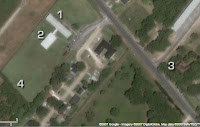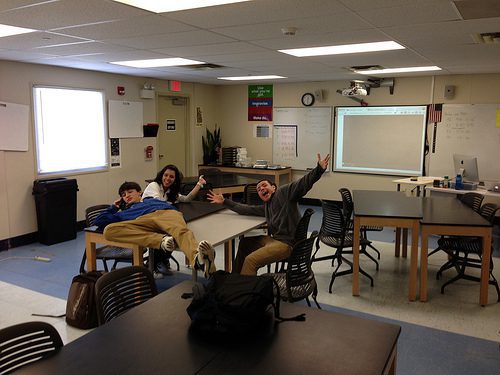We just returned from a week in Port Sulphur. A lot has changed in the 10 weeks since Christmas, so I’m reposting with an update at the end.
Everyone has a story. Some tell their stories, others keep a private life. Put more than 3,000 people through a disaster of epic proportions, and many of them will share their stories. So here you are: the residents of Port Sulphur, Louisiana [Google Maps | Wikipedia], and their stories… [More on how you can help later]
August 29
Hurricane Katrina wiped out the town of Port Sulphur. With a 20-foot tall levee on the northeast side holding back the “mighty Mississippi” River and a 20-foot tall levee on the southwest side separating the town from the bayou and the Gulf of Mexico, waves upwards of 25 feet breached the levee and flooded the town for nearly a week.
 A doctor’s office located across the street from Port Sulphur Baptist Church floated to the back of the church property [1: original PSBC building; 2: original PSBC Fellowship Hall; 3: original location of Port Sulphur Family Practice; 4: new location of PSFP (shown in other picture)]. St. Patrick’s Catholic Church was the only building in Port Sulphur capable of being inhabited after the storm, after significant rebuilding efforts.
A doctor’s office located across the street from Port Sulphur Baptist Church floated to the back of the church property [1: original PSBC building; 2: original PSBC Fellowship Hall; 3: original location of Port Sulphur Family Practice; 4: new location of PSFP (shown in other picture)]. St. Patrick’s Catholic Church was the only building in Port Sulphur capable of being inhabited after the storm, after significant rebuilding efforts.
The peninsula stretches southeast of New Orleans, with the town of Port Sulphur located 50 miles away. Conoco-Philips runs an oil refinery just north of the town, employing many on the peninsula. According to 2000 US Census Statistics, the peninsula is incredibly diverse: 45% white, 44% black or African-American and 7% Native American. The average commute to work is over 30 minutes. Twenty-two percent of people are under the poverty line, 40% of people over age 25 have less than a high school education, and the per capita income is more than $8,000 below the national average.
December 2006
Much of the population has returned, but key businesses have not. A handful of gas stations, car wash, Ace Hardware, a handful of restaurants and the post office have been rebuilt. The skeleton of the Family Dollar stands empty on the side of the road, in better condition than most original buildings. Among the missing: a grocery store and a fire station. The nearest grocery store is over 25 miles away. Port Sulphur’s grocery store was scheduled to open this month, but has not neared completion. Half the fire station remains, as do two trucks and donated supplies and trucks, but no one is there to staff it. The Port Sulphur Sheriff’s Department created a park for sheriff’s deputies to park their temporary FEMA trailers.
As soon as residents were able to return to Port Sulphur, Pastor Martin says Mrs. Connie was one of the first to return. She knew she had a mission to fulfill in the community and quickly got to work. Using all of her savings coupled with her tireless effort, Mrs. Connie reconstructed the Port Sulphur Ace Hardware to be a beacon of light to the community. Martin said the building looked top-notch. Mrs. Connie knew that residents would need hardware and building supplies, and she wanted to help — giving them the resources they needed, and a listening ear to hear their stories.
Pastor Lynn, of Port Sulphur Baptist Church, continues to lead the only Baptist church on the peninsula. Pastor Martin, of Grace Harbour Church, has partnered with Lynn to jump-start the community and help meet the needs of the people. The Bush-Clinton Katrina Fund has provided assistance for both churches. For nearly a year, they’ve been running a food pantry out of the Baptist church, with food coming from Second Harvest New Orleans.
Food has been brought in free of charge, but beginning in January 2007 Second Harvest will have to charge $0.04/pound to cover their costs because FEMA is no longer providing that assistance. A load of food delivered in late December would have cost $3,400. Also in January 2007, the food distribution will move to Grace Harbour because construction will continue inside the new PSBC building as teams from Virginia and Oklahoma begin framing work.
The churches also partnered in December to begin a new housing program for the people of Plaquemines Parish. Since the months immediately after Katrina, FEMA has provided temporary mobile trailer units with varied success. Many families who still need a place to live remain homeless due to the slow process of receiving one of these trailers through FEMA’s red tape. Pastor Martin lear
ned of a separate stock of FEMA trailers meant to be used as a permanent residence. These $50,000 units come fully furnished and are being distributed by FEMA through non-profit organizations. Insurance and other processing costs may be passed onto residents, but the units are provided by FEMA free of charge. In the last weeks of 2006, Grace Harbour compiled a list of nearly 1,000 residents who were interested in obtaining a trailer. Nearly 250 of those individuals were still residing out of state and continued to hold out hope that they could return to Plaquemines Parish.
The Saints and Hornets have returned to southern Louisiana, and the Sugar Bowl returned in early January 2007. The westbound I-10 bridge connecting Slidell and New Orleans over Lake Ponchatrain was repaired, but crossing the bridge into New Orleans carries drivers past miles and miles of destruction, until you reach the near-pristine downtown area of New Orleans. One apartment complex on I-10 with many damaged units displayed this sign: “Apartments for Lease.” As Curtis, a local aid worker, noted, “It’s nice that they’ve got the Saints back, but it’s no good if people aren’t here to enjoy it.”
Much work remains in Port Sulphur, and throughout southern Louisiana and Mississippi. If you want to contribute time, contact your local Baptist church, the Salvation Army or the Red Cross, or contact Pastor Martin and Grace Harbour Church directly through their website. To make a tax-deductible contribution to the feeding program and rebuilding efforts in Port Sulphur [A 501(c)3 Non-Profit Organization], send contributions to:
Port Sulphur Baptist Church
26845 Highway 23
Port Sulphur, LA 70083
And for those who can’t contribute time or money right now, the people of the Gulf Coast region certainly welcome our continued support through prayer.
March 2007
March and April bring prayers for the departure of the gnats. They swarm and bite, annoy the people of Port Sulphur, and plaster the fronts of vehicles. In just 10 weeks, the weather has changed, the gnats have come out. And the people of Port Sulphur have continued to make great strides toward recovery.
The church building at Port Sulphur Baptist has been framed and sheetrocked. The fellowship hall which was a mess of steel beams in December has now been repaired, roofed and closed in. The list that Pastor Martin had compiled of Plaquemines Parish residents still seeking a FEMA Trailer to move home continues to grow as he moves closer to receiving shipments of trailers from FEMA. Martin and Lynn are still receiving food from Second Harvest. The grant was extended, so they still have not paid for any of the 2,000,000 pounds of food they have distributed. The twice-weekly shipments total 20 tons of food and are distributed three times each week from Grace Harbour.
Carlton’s house has progressed immensely: the walls are up and the roof is on. And the grocery store is scheduled to open in just a few weeks.
Yet much work still remains. Two from our group arrived early and visited Port Sulphur Baptist Church on Sunday morning for worship and noticed the church had no Bibles. Our team was able to donate some Bibles to the church, but they can still use more. [Order from CBD and have them shipped to the address above]. Pastor Lynn would like to give a Bible to each recipient of one of the sheds we built. Twenty-four sheds have been constructed, and the church has received a grant to build over 20 more. FEMA trailers have little space for storage, so a shed is a great commodity.
We spent Thursday afternoon in New Orleans, which included a stop in the Ninth Ward. Most of the homes have been torn down and a new flood wall has been constructed. Rumor has it that Donald Trump wants to rebuild the Ninth Ward.
The region has improved since December, but a lot needs to happen. Just off Interstate 59 in Mississippi sits a field full of FEMA trailers — uninhabited. Why do thousands of FEMA trailers sit empty in a field when families throughout the Gulf Coast still do not have homes? The bureaucracy and red tape inhibit acquiring a trailer. Once last week I heard that a family had rebuilt their home and called FEMA to ask for their trailer to be removed. FEMA told them there was no record of the family having a trailer.
The glamor of helping the Gulf Coast region has waned, yet the help is still needed. We can all help out.


